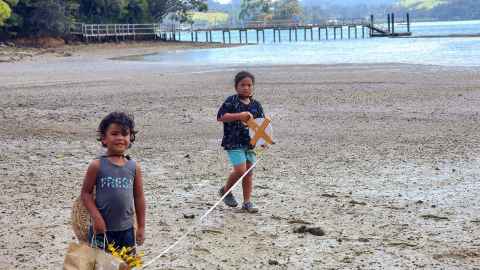Thriving amid colonisation: focus on Northland hapū
6 November 2025
A Northland hāpu's ability to thrive despite changes wrought by colonisation is the focus of a University of Auckland study awarded a Marsden Fund standard grant of $853,000 over three years.

How a Northland hapū (sub tribe) has adapted and thrived despite the impacts of colonisation is the focus of a newly funded Marsden project at the University of Auckland.
The project will combine archaeology, philosophy, history, and mātauranga Māori – Māori knowledge systems – to understand how Ngāti Manu, a hapū of Te Pēwhairangi (Bay of Islands), has sustained collective well-being despite generations of disruption.
Working in close partnership with the community, it will be led by two researchers from the University’s Faculty of Arts and Education: Thegn Ladefoged, professor of archaeology, and Krushil Watene (Ngāti Manu, Te Hikutu, Ngāti Whātua Ōrākei, Tonga), associate professor of philosophy.
Watene, who is a hapū member herself, says immense change has been shaping her whānau for generations.
“Their forests and gardens became European farms and pastures, traditional exchanges gave way to market-driven trade, and local territorial rivalries became existential struggles for sheer tribal survival.”
Despite these challenges, she says, Ngāti Manu has managed to sustain cultural identity and social cohesion.
Working alongside the community, the research team will trace the hapū’s journey from pre-European times through to the post-contact era, says Watene.
“Guided by the concept of ‘collective continuance’ [a society’s overall capacity to maintain its wellbeing] this will involve investigating significant sites and landscapes, mapping tribal relationships and responsibilities, exploring social institutions, and digitally reconstructing heritage environments and key historical moments.”

At its heart, the project is about understanding how Indigenous communities like Ngāti Manu have responded to change, building resilience through innovation and a focus on future generations, says Ladefoged.
“By combining archaeological evidence with community knowledge and historical insight, we can build a richer picture of how this group of people have been able to adapt.”
A key outcome of the study, he says, will be the creation of immersive digital reconstructions of ancestral landscapes.
“These tools will make the past accessible in engaging new ways, and we hope will support education, cultural revitalisation, and community-led tourism initiatives that boost economic development.”
Watene emphasises the project is grounded in kaupapa Māori and led by the aspirations of Ngāti Manu themselves.
“This is a collaborative effort that honours the knowledge and leadership of the hapū. It’s about telling our stories in our own ways and using research to support flourishing futures for our communities.”
The researchers believe the study will contribute to global conversations about Indigenous adaptation and sustainability, and act as a blueprint for other communities facing ecological, economic and social disruption.
Ko te Rerenga o te Matuku (The Flight of the Bittern): Interfacing Archaeology with History, Philosophy, and Mātauranga for Thriving Futures, co-led by Thegn Ladefoged and Krushil Watene, has won a Marsden Fund standard grant from the Royal Society Te Apārangi of $853,000 over three years.
About Ngāti Manu
- Ngāti Manu is based at Kāretu Marae, in the Kāretu Valley near the Taumarere River, which flows out to Opua, Paihia, and Kororāreka (Russell) in the Bay of Islands.
- The community has a long history of strategic leadership and adaptation, especially during the early contact period with Europeans.
- Ōtuihu Pa, once a stronghold of Ngāti Manu, was destroyed by British forces in the 1840s.
Media contact
Julianne Evans | Media adviser
M: 027 562 5868
E: julianne.evans@auckland.ac.nz